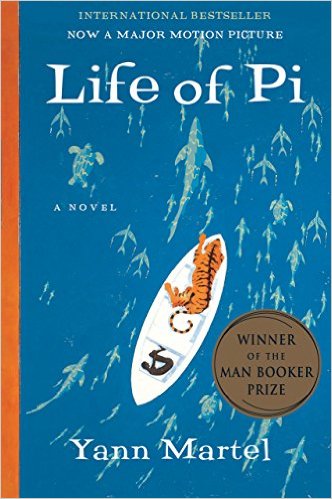WARNING: Contains Spoilers
Most of this book is a first-person account of a sixteen year-old Indian boy’s experience spending 227 days alone with a Bengal tiger in a lifeboat on the Pacific Ocean. It spares us the suspense of wondering whether he survives by telling us up front that he lives to graduate from college, get married, father children and tell his story to a second narrator who cuts in briefly now and then. It begins with a good thirty chapters about the boy’s background, including how he came to call himself Pi and what led him and his family to be on board a ship full of zoo animals bound from India to Canada that suddenly, for no apparent reason, sank in the Pacific. It ends with a transcript of his conversation with two Japanese men, representatives of the company that owned the ship. But apart from these structural details it is mainly memorable as a unique story of endurance and religious faith.
The population of the lifeboat at the start of the ordeal includes a swarm of flies, some cockroaches, a rat, a zebra with a broken leg, a female orangutan, and a hyena, besides tiger and boy. It shrinks rapidly and violently to two, and stays at that number for the rest of the trip, except for some fish and turtles the boy catches for food and bait. It doesn’t take long for him to realize that his only hope of survival is to tame the tiger, and that brings with it the obligation to feed and water it. Lost adrift without any idea how to navigate, all he can do for the better part of a year is pray, suffer, and struggle to survive.
Along the way, if way it may be called, the strange pair of survivors encounters another castaway literally by blind chance. But that episode doesn’t end happily. Pi, brought up a vegetarian, learns to eat many things he would never have dreamt of trying, and some things that would turn the stomach of anyone who wasn’t starving. He makes full use of remarkable survival technologies such as solar stills and raincatchers. He learns to use his own urine to mark territory which, contrary to the cover art, is not the bow half of the bottom of the boat but only a tarpaulin stretched over it. He overcomes seven months of the strain of being separated only by a foot of space and a thin layer of canvas from a fierce predator. And he discovers a strange, almost surreal floating island where there is abundant fresh water and food for both boy and tiger, but only at a gruesome price.
Pi’s story is sad and inspiring, and it overflows the boundary of pure narrative to meditate on the nature of storytelling and the love of God. From a theologian’s perspective, I don’t buy Pi’s argument that one can be a devout Hindu, Christian and Muslim at the same time, but his quirky religion adds to the charm of the story. His background as a zookeeper’s son in India has the makings of an entertaining young adult novel even without the survival ordeal that follows it. There is also a clever surprise, revealed at the point where the main attraction begins, but I don’t want to spoil in any way.
This book was an international bestseller and Man Booker Award winner. It was made into a movie that won Ang Lee an Oscar for Best Director. There is also a stage version by Keith Robinson, an illustrated edition, and an audiobook narrated by Jeff Woodman, with the secondary narrator played Alexander Marshall in an audible nod to this novel’s unusual structure. I personally recommend this audio version. Woodman is good with gentle Indian, Japanese and French accents, but his special gift to this book is the charm he lends to the character of Pi.
A French Canadian author who prefers to write in English, Yann Martel traveled widely in his youth due to his father’s diplomatic career. Among his other works to-date are the novels Self and Beatrice and Virgil, a short story collection, and a series of book reviews that he wrote in the form of letters to Canadian Prime Minister Stephen Harper.




